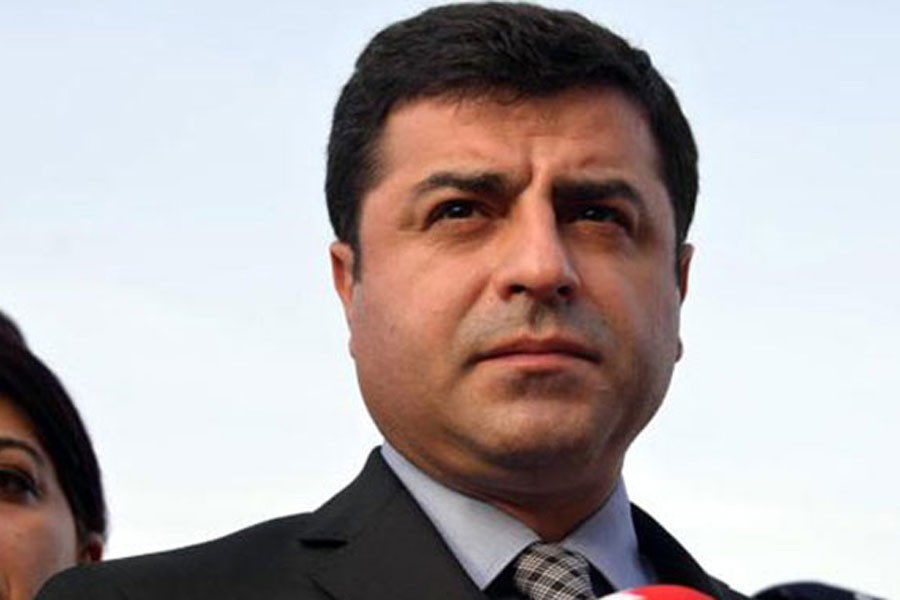Selahattin Demirtaş’s defence and Turkey’s trial with peace
Demirtaş’s trial and his defence is very important and should not be lost within the wide range of other ongoing issues.
 Selahattin Demirtaş
Selahattin Demirtaş Fotoğraf: DHA
At a time when Turkeys, 'security' policies are aimed at decimating the limited freedom that is left in the country, the century-old Kurdish Question is going through a critical period in terms of its distance to a peaceful solution.
It is well known that policies which reduce the Kurdish Questionsolely into “fighting terrorism”, have over time deepened the issue and turned this into a regional problem. Despite this centuries-old truth, which the state authorities intermittently accept, we are at a time when the same ominous policies are in place.
For a while, defending peace has meant taking a risk. In recent times, three key points stand out in relation to defending peace. One of the includes academics who were expelled from their post at universities and whose trials are ongoing for signing a peace declaration. The second issue which comes to light is in relation to the HDP party which received 6 million people’s votes. It is the largest third party in parliament and still, its co-chairs, MPs, deputies and mayors are kept behind iron bars. Thirdly, through the appointment of administrators and arrests, the Kurdish media is being prevented from publishing and broadcasting.
Considering these current issues, Demirtaş’s trial and his defence is very important and should not be lost within the wide range of other ongoing issues.
Demirtaş, at his hearing on 11 April in relation to the Kobane incidents which took place between 6-8 October, said that they contacted the Minister of Internal Affairs, Efkan Ala, through Sırrı Süreyya Önder and that they expressed their endeavour to make a coordinated effort to prevent any deaths. Demirtaş explained that Efkan Ala had replied that “there are security forces which we cannot control" and requested that Efkan Ala to be called as a witness.
Demirtaş, continuing his defence on 12 April stated that he continued to oppose the digging of trenches and barricades and made speeches in various districts, stating that “the speeches we made in these districts, interestingly were not covered by the mainstream or the Kurdish media.”
Of course, the question of “why there was no coverage given?’ has a significance which needs to be noted by those concerned.
Demirtaş reminded (the court) that the first trench-barricades were discovered towards the end of 2014 on the motorway path between Diyarbakir-Bingöl cities and in Cizre while peace talks were on-going. He went on to say that İdris Baluken, Sırrı Süreyya Önder, Pervin Buldan and co-chair of DTK, Hatip Dicle - who were part of the peace talks at the time - made an effort and were persuasive in bringing an end to the trenches.
In the summer of 2015, I went to Cizre, Silvan, Nusaybin, Sur and various other districts and witnessed the efforts made by HDP representatives in reducing the tension and in bringing an end to the deaths. This was covered within the media.
When we look back, we remember that the HDP’s winning of 13.1% of the vote in the national elections on 7 June 2015, meant that the HDP had become a political power able to prevent the AKP becoming a majority government. Erdogan and his party dismissed these election results, dragged the country into a further election 1 November 2015 and during the interim abandoned the peace negotiations and applied a strategy of increasing tensions. During this period the “fighting against the trenches” was a key lever and was how the government changed the parliamentary balance in its favour and resulted in the election results on 1 November. Over time, the psychological barriers to defending peace were overcome and a period began when sections of society most ready to pay a price took on the cause and continued the struggle for peace.
As a politician during a difficult and special period, Demirtaş took on an important role and took responsibility for critical negotiations, and through his testimony, he portrays a photo of that period.
Erdogan has said that from now on negotiations have been frozen and his photos, despite not being in the pre-election period, have been plastered on billboards across cities and the metro. In this context, is it necessary to even search for a legal reason why Demirtaş – who had said clearly ‘we will not let you be president’ - is in prison?
Demirtaş’s rhetoric even made those under the influence of nationalist propaganda question their own language, and his imprisonment is a way to punish everybody defending peace and taking the initiative towards this end.
And it is for this reason that those defending peace must take the price paid by Demirtaş and other MPs personally. Of course, it is no crime to defend peace during comfortable less risky periods. But we know that peace does not come to those who do not fully defend it in hard times. It is precisely for this reason that Demirtaş’s defence and trial is a part of Turkey’s trial with peace.
Translated by Cem Erol


Follow Evrensel